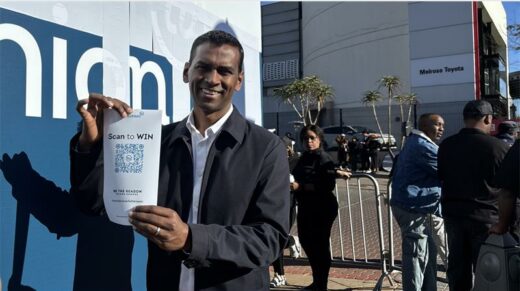Our Terms & Conditions | Our Privacy Policy
TransUnion Africa billboard brings credit lessons to life
TransUnion Africa, literally, pulled back the layers on one of South Africa’s biggest financial blind spots: How young people think about credit. At Melrose Arch on August 21, the company launched Africa’s first-ever peelable billboard as part of its Be the Reason Things Change campaign.
Onlookers were invited to peel away panels marked fear, exclusion, and misinformation. Beneath each layer sat a QR code, linking to a free e-learning course worth R2 000, designed to help South Africans better understand credit and how to use it.
Read more: TransUnion Rising Star Awards at Sandton
For fashion entrepreneur Tshepo Mohlala, founder of TSHEPO Jeans, who joined Springbok stars Makazole Mapimpi and Lukhanyo Am at the unveiling, the message hit close to home. “The biggest misconception is that credit is bad. Credit, when used wisely, actually reflects your integrity. It shows you can take responsibility and honour commitments. Without a credit record, people can’t measure your reliability, so having one is essential.”
He added that many South Africans, particularly young professionals and entrepreneurs, struggle with credit, not because they use it recklessly, but because they avoid it altogether. “A healthy credit record is often the difference between securing funding for a business, qualifying for a home loan, or being denied opportunity.”
Lee Naik, CEO of TransUnion Africa, after peeling a patch off the billboard. Photo: Duduzile Khumalo
Also read: TransUnion Auto Dealers’ Guide now in digital format
According to Lee Naik, CEO of TransUnion Africa, the new campaign is about addressing those knowledge gaps. “We have custom-designed 2 000 free credit education courses with the consumer in mind. We understand how difficult it can be to take control of your financial health. These tools are about giving people the confidence and know-how to do exactly that.”
Naik added that the initiative is not just about awareness, but about measurable impact. “We will be tracking how participants progress over time. The real test is whether someone can say: I have improved my financial health and accessed new opportunities because I took control. That’s the impact we want to see.”
He also noted that financial education plays an important role in addressing inequality in South Africa, which still has one of the highest income gaps in the world. “Thirty-one years into democracy, about 16 million people remain excluded from the financial system. If we can bring them in, whether as individuals building credit or as small businesses creating jobs, we can start shifting the needle. Credit education won’t erase inequality overnight, but it gives people access to tools that help them take charge of their futures.”
Follow us on our WhatsApp channel, Facebook, X, Instagram and TikTok for the latest updates!
At Caxton, we employ humans to generate daily fresh news, not AI intervention. Happy reading!
Images are for reference only.Images and contents gathered automatic from google or 3rd party sources.All rights on the images and contents are with their legal original owners.



Comments are closed.